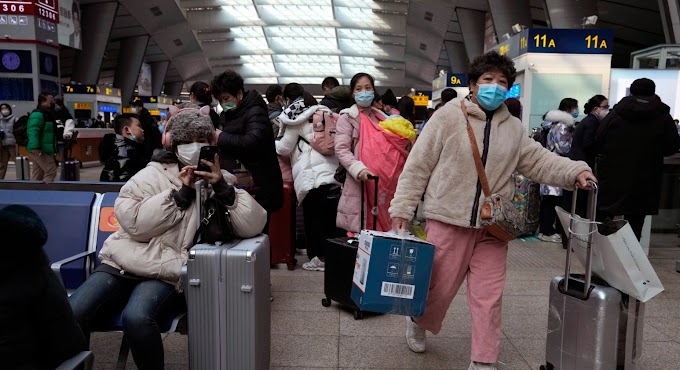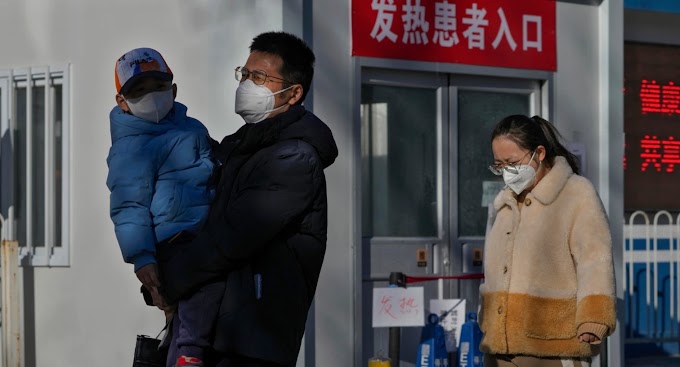WHO asks China to provide a "more realistic" epidemic report, but Chinese state media plays down the epidemic's severity.
 |
| File photo - World Health Organization (WHO) flag. The photo is a screenshot of the relevant video by the Associated Press in Beijing, China. Courtesy of Associated Press. |
Scientists at the World Health Organization say they want a "more realistic" report on the situation with COVID-19 from top Chinese experts as concerns mount over the country's rapid spread.
Reuters reported that the WHO on Tuesday (January 3) invited Chinese scientists to a closed-door video meeting with its Virus Evolution Technical Advisory Group to present data on the variant circulating in China. WHO hopes to have detailed discussions with China on the evolution of the new coronavirus, and looks forward to China's regular sharing of specific and real-time data on epidemiology, including more genetic sequencing data, data on the impact of the disease, including hospitalizations, ICU admissions and death toll etc. The meeting is closed to the public or media.
"We want to see a more realistic picture, to understand what's really going on," said Dutch virologist Professor Marion Koopmans, a member of the WHO committee.
She told Reuters ahead of the meeting that some data from China, such as the number of hospitalizations, was "not very credible". "It is in China's own interest to provide more reliable information," she said.
South African scientist Professor Tulio de Oliveira is also a member of the committee. He said it was "of course" good to have more information from China, but that also applies globally.
Professor Koopmans and colleagues hope to discuss similar information with scientists from the Chinese Center for Disease Control and Prevention at a World Health Organization meeting on Tuesday.
The panel is an international committee of experts that has come together throughout the pandemic and receives regular briefings from countries experiencing large waves of infections or new variants.
Prof Koopmans said they had seen only a "small fraction" of the cases sequenced in China so far - around 700 - and called for a global surveillance network to track the new coronavirus, SARS-CoV-2.
Just before the meeting, the official media controlled by the CCP tried their best to downplay the seriousness of this surge in infections.
International health experts predict that at least 1 million people in China will die from infection or complications of the new coronavirus this year. On Monday (January 2), China reported only three deaths from the novel coronavirus, and there were one or a few cases per day for many days before that. Therefore, the infection and death data provided by China has been widely questioned at home and abroad.
On December 7 last year, without preparation, China suddenly canceled the "zero-clearing" epidemic prevention and control that Xi Jinping personally deployed and personally directed for the past three years, triggering a "wildfire-like" large-scale infection across the country, resulting in At least hundreds of millions of people have been infected in a short period of time, and the medical system is overwhelmed. Hospital fever clinics, emergency departments, and intensive care units are overcrowded. Countless elderly people and people with underlying diseases have died. Funeral parlors and crematoria are overloaded, and many remains cannot be removed in time. And decent storage, cremation often has to wait for ten days or longer, and in some places, there are even tragic situations where people burn their bodies in the community by themselves.
In the past three years, China has required strict multiple tests and long-term isolation for immigrants, and even refused to issue visas to some Chinese WHO wish to return to their country for funerals. Facing concerns about the outbreak of the epidemic in some countries, they require 48 hours for immigrants from China. Nucleic acid testing and other temporary epidemic prevention measures, Chinese Foreign Ministry spokesperson Mao Ning criticized on January 3 as "lack of scientific basis" and "unacceptable", and threatened that "corresponding measures will be taken in accordance with the principle of reciprocity according to different situations."
Meanwhile, the People's Daily, the Communist Party's mouthpiece, quoted Chinese experts on Tuesday as saying that for most people, the illnesses caused by the new coronavirus are relatively mild. Tong Zhaohui, deputy director of Beijing Chaoyang Hospital, told the People's Daily that severe and critical illnesses account for 3% to 4% of infected patients currently admitted to designated hospitals in Beijing.
Kang Yan, director of West China Tianfu Hospital of Sichuan University, said that in the past three weeks, a total of only 46 patients have been admitted to the intensive care unit, accounting for only about 1% of symptomatic infections.
However, Reuters reported that an eyewitness said the emergency department of Zhongshan Hospital in Shanghai was overwhelmed with patients. Some patients were being dripped on beds in hospital corridors, and many were waiting in line to see a doctor. It was not possible to verify how many of those people needed medical treatment because of the new coronavirus.
Separately, Bloomberg reported Tuesday that a family in Shanghai waited five days for a funeral vehicle to remove the remains of their loved ones parked at their home.
According to the report, Shanghai Longhua Funeral Home posted a public announcement over the weekend that it received more than 500 remains daily, about five times more than usual. And after waiting for hours, families were brought in and out of the room like they were put on a conveyor belt, and each family was only allowed five to ten minutes to hold a simple meeting in the crowded room filled with yellow body bags. The farewell ceremony completely lacked the dignity of a traditional Chinese funeral.
According to the report, a staff member WHO answered the phone at the Longhua Funeral Home said that the entire system was paralyzed, beyond what could be tolerated. And similar situations are playing out in funeral homes and crematoria across China. Grieving family members and exhausted workers showed the outside world that the Chinese authorities suddenly canceled the "clearing" epidemic prevention and control on December 7 last year, and the "tsunami" spread of the epidemic had an impact on the Chinese people and families.
At the same time, the World Health Organization once again asked China to regularly share specific and real-time data on the epidemiological situation, including more gene sequencing data, data on the impact of the disease, including hospitalizations, ICU admissions and deaths, etc. The WHO also asked the Chinese government to provide data on vaccination status, especially among vulnerable groups and those over 60 years old.
WHO officials held talks with Chinese officials on Dec. 30 about the surge in coronavirus cases in China, urging China to share real-time data so other countries could respond effectively.
Reuters said that some experts doubt that China will be very candid. The report quoted an expert in Singapore as saying that he does not think China will be very sincere in disclosing the data because China's transparency is an issue.
also read about history Textodaily







